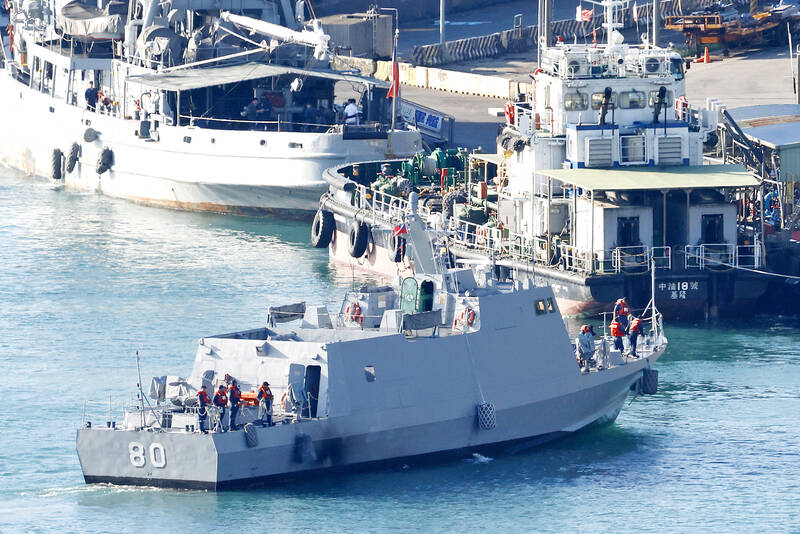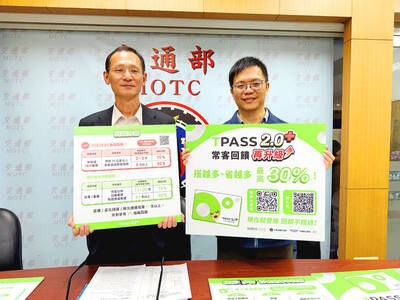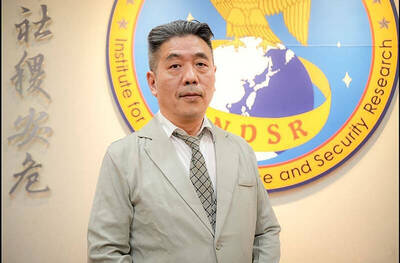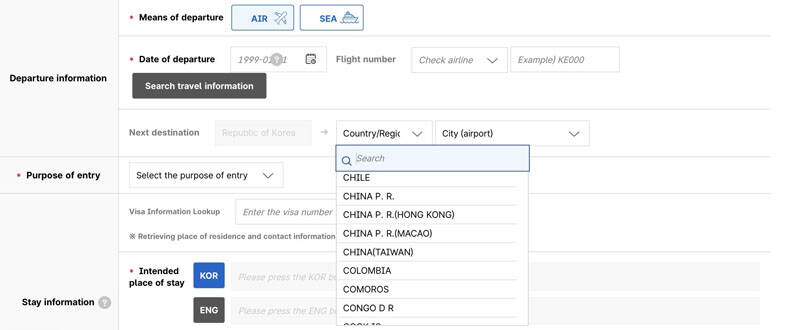Disruptions to trade in the Taiwan Strait, where in 2022 approximately US$2.45 trillion of goods — over one-fifth of global maritime trade — transited, would send shock waves well beyond Taiwan and China, a US-based think tank said in a report published just days before Chinese military drills around Taiwan.
The Center for Strategic and International Studies (CSIS) on Thursday published on its Web site a report titled “Crossroads of Commerce: How the Taiwan Strait Propels the Global Economy.”
China’s rising assertiveness has sparked fears that it might soon attempt to use force to bring Taiwan under its control, but Beijing has a range of options short of an invasion at its disposal, the report said.

Photo: Ritchie B. Tongo, EPA-EFE
CSIS research suggested that less kinetic actions, such as a coast guard-led quarantine of Taiwan, are more likely in the short term, and such lower-intensity contingencies could still threaten the trillions of dollars of trade that moves through the Taiwan Strait each year, it said.
Yesterday, the Chinese People’s Liberation Army announced the start of its “Joint Sword-2024B” drills around Taiwan.
More than 90 percent of cutting-edge chips are produced in Taiwan, while Taiwan’s ports in 2022 handled trade worth an estimated US$586 billion, the report said.
Any disruption of commercial traffic through the Strait might prompt shipping companies to stay out of the area to limit risks and avoid paying spiked insurance premiums, it said.
However, forced deviations from well-worn routes come at a cost, including longer journeys and delays that ultimately affect consumers, it said.
Two key US allies, Japan and South Korea, would be among those most affected by disruptions, it said.
Thirty-two percent of Japan’s imports and 25 percent of its exports — totaling nearly US$444 billion — transited the Strait in 2022, and South Korea depended on the waterway for 30 percent of its imports and 23 percent of its exports, amounting to about US$357 billion in goods, the report said.
Both countries rely on the Strait for importing raw materials to meet their immense energy needs, with more than 95 percent of Japan’s and 65 percent of South Korea’s crude oil sourced from a select group of Middle Eastern countries, of which much of the trade passes through the Strait, it said.
As for the effects on other Indo-Pacific countries, nearly 27 percent of Australia’s exports passed through the Taiwan Strait in 2022, totaling almost US$109 billion, it said, adding that the Philippines, Vietnam, Thailand, Laos and Myanmar are less dependent on the waterway.
Moreover, “the Taiwan Strait’s importance is not limited to Indo-Pacific countries,” the report said, adding that the four countries most reliant on the Strait are in Africa.
The Democratic Republic of the Congo shipped nearly US$13 billion of metals — 62 percent of its total global exports — through the Strait, Eritrea used it to export more than 70 percent of its zinc and copper ores to China, and Gabon and Angola shipped about 40 percent of their oil to China through the passage, it said.
Countries in the Middle East are similarly reliant on the Taiwan Strait for transporting oil to Asian markets, with Oman, Saudi Arabia, Iraq, Kuwait, Qatar and Yemen sending more than 30 percent of their exports through it, the report said.
“On average, the nine BRICS economies rely on the Taiwan Strait for about 14 percent of their imports and 15 percent of their exports. That is more than twice the level of dependence of the G7 economies,” it said.
Positioning itself as a leader and voice of developing countries, Beijing’s need to maintain diplomatic support from these nations to advance its vision — an international order beyond the “Western approach” — might make it more sensitive to their concerns, it said.
“Faced with severe disruptions to their trade, they [the developing countries] could collectively exert significant pressure on Beijing to resolve a conflict to avoid long-term economic pain,” it said.
“Ensuring free and open maritime trade through the Taiwan Strait is critical not just for nearby nations like China, South Korea and Japan, but for the entire global economy,” the report said. “For Washington, working closely with allies and partners to maintain cross-strait stability is essential to safeguarding international trade.”

Taipei and Kaohsiung have extended an open invitation to Japanese pop star Ayumi Hamasaki after Chinese authorities abruptly canceled her scheduled concert in Shanghai. Hamasaki, 47, had been slated to perform on Saturday before organizers pulled the show at the last minute, citing “force majeure,” a move widely viewed as retaliation for Japanese Prime Minister Sanae Takaichi’s recent remark that a Chinese attack on Taiwan could draw a military response from Tokyo. Taipei Mayor Chiang Wan-an (蔣萬安) yesterday said the city “very much welcomes” Hamasaki’s return and would continue to “surprise” her. Hamasaki, who has a large global fan base, including

Starting next month, people who signed up for the TPass 2.0 program can receive a 15 percent rebate for trips on mid to long-distance freeway buses or on buses headed to the east coast twice every month, the Highway Bureau said. Bureau Director-General Lin Fu-shan (林福山) said the government started TPass 2.0 to offer rebates to frequent riders of public transportation, or people who use city buses, highway buses, trains or MRTs at least 11 times per month. As of Nov. 12, 265,000 people have registered for TPass 2.0, and about 16.56 million trips between February and September qualified for

The year 2027 is regarded as the year China would likely gain the capability to invade Taiwan, not the year it would launch an invasion, Taiwanese defense experts said yesterday. The experts made the remarks after President William Lai (賴清德) told a news conference on Wednesday that his administration would introduce a NT$1.25 trillion (US$39.8 billion) special defense budget bill to boost Taiwan’s overall defense posture over the next eight years. Lai said that Beijing aims for military unification of Taiwan by 2027. The Presidential Office later clarified that what Lai meant was that China’s goal is to “prepare for military unification

‘REGRETTABLE’: Travelers reported that Seoul’s online arrival card system lists Taiwan as ‘China (Taiwan),’ the Ministry of Foreign Affairs said The Ministry of Foreign Affairs yesterday urged South Korea to correct the way Taiwan is listed in its newly launched e-Arrival card system, saying the current designation downgrades the nation’s status. South Korea rolled out the online system on Feb. 24 to gradually replace paper arrival cards, which it plans to phase out by next year. Travelers must complete the electronic form up to 72 hours before entering the country. The ministry said it has received multiple complaints from Taiwanese travelers saying that the system lists Taiwan as “China (Taiwan)” in dropdown menus for both “place of departure” and “next